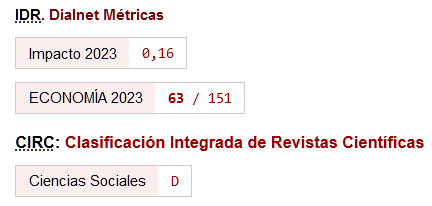Limits and contradictions of post-developmentalism as a heterodox approach to capitalist development
Keywords:
capitalism, theory of development, post-developmentanism, de-growthAbstract
An important part of the current debates and controversies about development and their implications are derived from the post-structuralist turn of development studies. In particular, in recent years the ideas and proposals associated with post-developmental approaches have been extended, trying to promote and lead the anti-capitalist discourse, even challenging efforts to shape horizons of alternative development (non-capitalist). However, this claim to promote alternatives to development, without distinguishing its modalities or linking it with the debate on economic systems, can disrupt the construction of viable strategies of action and dilute important elements of the contributions advanced by the heterodox tradition, mainly. This work aims to critically assess the limitations of post-developmentalism to articulate a heterodox paradigm that can be measured with the conventional and hegemonic approaches in development studies oriented, ultimately, to the reproduction of capitalist development.
Downloads
References
Amin, Samir (1997): El capitalismo en la era de la globalización, Barcelona: Paidós, 1999.
Amorós, Miguel (2012): Salidas de emergencia, Logroño: Pepitas de Calabaza.
Braudillard, Jean (1983): Simulations, Nueva York: Semiotext(e).
Bretón, Víctor (2013): "Etnicidad, desarrollo y 'Buen Vivir': reflexiones críticas en clave histórica", Revista Europea de Estudios Latinoamericanos y del Caribe, nº 95, pp. 71-95.
https://doi.org/10.18352/erlacs.9231
Ceceña, Ana Esther (2013): "Subvertir la modernidad para vivir bien", en Raúl Ornelas (coord.) Crisis civilizatorias y superación del capitalismo, México DF: Instituto de Investigaciones Económicas, pp. 91-128.
Corbridge, Stuart (1998): "'Beneath the Pavement Only Sail': The Poverty of Post-Development", Journal of Development Studies, nº 36(4), pp. 138-148.
https://doi.org/10.1080/00220389808422549
Escobar, Arturo (1992): "Planning", en Wolfgang Sachs (ed.) The Development Dictionary, London: Zed Books, pp. 132-145.
Escobar, Arturo (1995): Encountering Development: The Making and Unmaking of the Third World. Princeton: Princeton University Press.
Escobar, Arturo (2015): "Decrecimiento, post-desarrollo y transiciones: una conversación preliminar", Interdiciplina nº 3(7), pp. 217-244.
https://doi.org/10.22201/ceiich.24485705e.2015.7.52392
Esteva, Gustavo (1992): "Development", Wolfgang Sachs (ed.) The Development Dictionary, London: Zed Books, pp. 7-25.
Esteva, Gustavo (1985): "Beware of Participation", Development: Seeds of Change, nº 3, pp. 77-79.
Gandhi, Mahatma (1997): "The Quest for a Simple Life: My Idea of Swarej", en Majid Rahnema y Victoria Bowtree (eds.) The Postdevelopment Reader, Zen Books: Londres, pp. 306-307.
García, Ernest (2012): "Degrowth, the past, the future, and the human nature", Futures, nº 44, pp. 546-552.
https://doi.org/10.1016/j.futures.2012.03.015
García, Santiago, Ramírez-Cendrero, Juan M. y Santillán, Alejandro (2017): "Sumak kawsay in Ecuador: The role of communitarian economy and the experience of the rural communities in Sarayaku (Ecuadorian Amazonia)", Journal of Rural Studies, nº 53, pp. 111-121.
https://doi.org/10.1016/j.jrurstud.2017.05.018
Georgescu-Roegen, Nicholas (1975): "Energy and Economic Myths", Southern Economic Journal, nº 41(3), pp. 347-381.
https://doi.org/10.2307/1056148
González Reyes, Luis (2010): "Decrecimiento y relaciones centro-periferia", en Carlos Taibo (dir.) Decrecimiento. Sobre lo que hay que cambiar en la vida cotidiana, Madrid: Los Libros de la Catarata, pp. 225-237.
Gudynas, Eduardo (2010). "Si eres tan progresista, ¿por qué destruyes la naturaleza? Neoextractivismo, izquierda y alternativas", Ecuador Debate, nº 79, pp. 61-81.
Hamilton, Clive (2003): El fetiche del crecimiento, Pamplona: Laetoli, 2008.
Illich, Ivan (1997): "Development as Planned Poverty", en Majid Rahnema y Victoria Bowtree (eds.) The Post-Development Reader, Londres: Zen Books, pp. 94-102.
Kay, Cristóbal (1989): Latin American Theories of Development and Underdevelopmet, Londres/Nueva York: Routledge.
Kiely, Ray (1999): "The Last Refuge of the Noble Savage? A Critical Assessment of Post-Development Theory", European Journal of Development Research, nº 11 (1), pp. 30-55.
https://doi.org/10.1080/09578819908426726
Latouche, Serge (2003): Decrecimiento y postdesarrollo. El pensamiento creativo contra la economía del absurdo, Barcelona: El Viejo Topo, 2009.
Latouche, Serge (2004): Sobrevivir al desarrollo: de la descolonización del imaginario colectivo a la construcción de una sociedad alternativa, Barcelona: Icaria, 2007.
Latouche, Serge (2006): La apuesta por el decrecimiento. ¿Cómo salir del imaginario dominante?, Barcelona: Icaria, 2008.
Leff, Enrique (2008): "Decrecimiento o desconstrucción de la economía: hacia un mundo sustentable", Polis, nº 7(21), pp. 81-90.
https://doi.org/10.4067/S0718-65682008000200005
Martínez Alier, Joan (2009): "Socially Sustainable Economic De-growth", Development and Change, nº 40(6), pp. 1099-1119.
https://doi.org/10.1111/j.1467-7660.2009.01618.x
Navarro, Vicenç (1978): La medicina bajo el capitalismo, Barcelona: Crítica.
Palma, Gabriel (1981): "Dependencia y desarrollo: una visión crítica", en Dudley Seers (comp.), La teoría de la dependencia. Una revaluación crítica, México, D.F.: FCE, 1987, pp. 21-89.
Parfitt, Trevor (2002): The End of Development: Modernity, Postmodernity and Development, Londres: Pluto Press.
Peet, Richard y Elaine Hartwick (1999): Theories of Development, Nueva York: The Guilford Press.
Pieterse, Jan Nederveen (1998): "My Paradigm or Yours? Alternative Development, Post-Development, Reflexive Development", Development and Change, nº 29(2), pp. 343-373.
https://doi.org/10.1111/1467-7660.00081
Pieterse, Jan Nederveen (2000): "After post-development", Third World Quarterly, nº 21, pp. 175-191.
https://doi.org/10.1080/01436590050004300
Rahnema, Majid (1997): "Towards post-development: searching for signposts, a new language and new paradigms",en Majid Rahnema y Victoria Bawtree (eds), The Post-Development Reader, Londres: Zed Books, pp. 377-403.
Rahnema, Majid y Victoria Bawtree (eds.)(1997): The Post-Development Reader, Londres: Zen Books.
Riechmann, Jorge (1995) Desarrollo sostenible: la lucha por la interpretación, en José Manuel Naredo y Jorge Riechmann et al. De la economía a la ecología, Madrid: Trotta, pp. 11-36.
Rist, Gisbert (1996) El desarrollo: historia de una creencia occidental, Madrid: Los Libros de la Catarata, 2002.
Roca, Jordi (2007): "La crítica al crecimiento económico desde la economía ecológica y las propuestas de decrecimiento", Economía Ecológica, nº 33, pp. 13-17.
Sachs, Ignacy (1980): Strategies de l'écodeveloppement, Paris: Editions Ouvries.
Sachs, Wolfgang (1992): "Introduction", en Wolfgang Sachs (ed.) The Development Dictionary, Londres: Zed Books, pp. 1-5.
Sachs, Wolfgang (ed.) (1992): The Development Dictionary, Londres: Zed Books.
Sachs, Wolfgang (1997): "La Need for the Home Perspective", en Majid Rahnema y Victoria Bawtree (eds.) The Post-Development Reader, Londres: Zen Books, pp. 290-300.
Shiva, Vandana (1988): Staying Alive: Women, Ecology and Development, Londres: Zed Books.
Svampa, Maristella (2015): "Commodities Consensus: Neoextractivism and Enclosure of the Commons in Latin America", The South Atlantic Quarterly, nº 114(1), pp. 65-82.
https://doi.org/10.1215/00382876-2831290
Taibo, Carlos (2009): En defensa del decrecimiento. Sobre capitalismo, crisis y barbarie, Madrid: Los Libros de la Catarata.
Taibo, Carlos (2014): ¿Por qué el decrecimiento? Un ensayo sobre la antesala del colapso, Barcelona: Los Libros del Lince.
Trainer, Ted (2012): "De-growth: Do you realise what it means?", Futures, nº 44, pp. 590-599.
https://doi.org/10.1016/j.futures.2012.03.020
Unceta, Koldo (2013): "Decrecimiento y Buen Vivir, debates sobre el postdesarrollo en Europa y América Latina", Revista de Economía Mundial, nº 35, pp. 197-216.
Wallerstein, Immanuel (1995): "¿El fin de qué modernidad?", Sociológica, nº 27, pp. 1-14.
Downloads
Published
How to Cite
Issue
Section
License
This licence allows third parties to share (copy and redistribute the material in any medium or format) and adapt (remix, transform and create from the material for any purpose, including commercial purposes), provided that authorship and first publication in this journal (The Journal, DOI of the work) is acknowledged, a link to the licence is provided, and it is stated whether changes have been made to the work.







